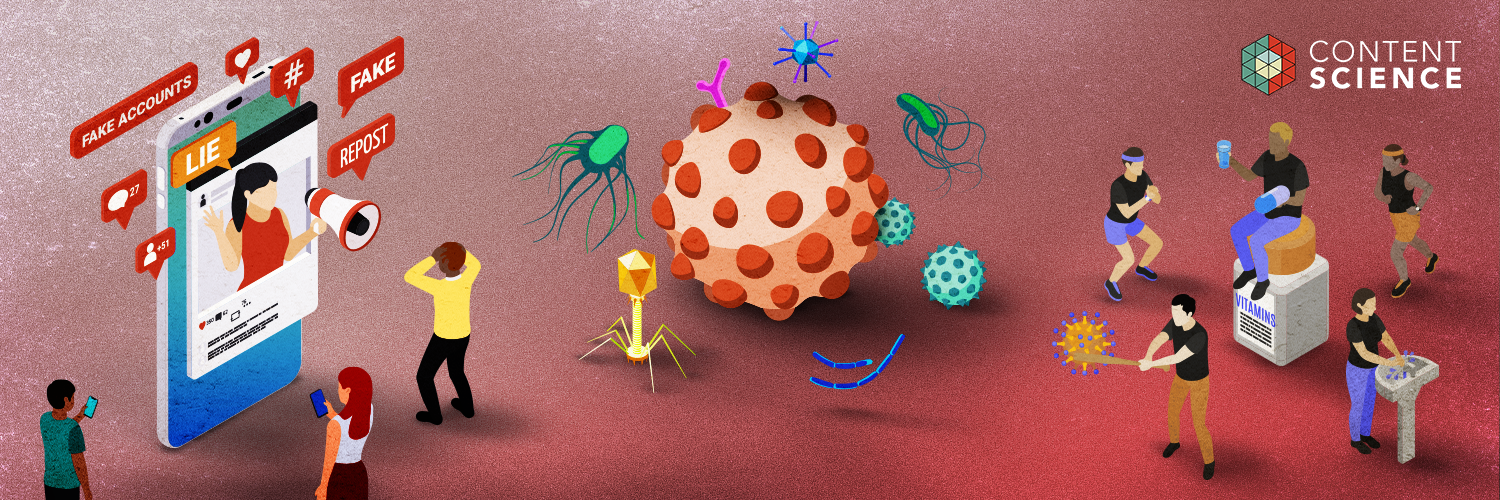
On May 7, only 30 days ago, the editors of Politico Magazine published a curated list of the top threats to the United States. Experts knew a pandemic would happen, just not when. What else keeps them up at night?
If you include COVID-19, the top three disaster threats are
- Novel virus
- Globalization of white supremacy
- Attacks on trust and truth (misinformation / disinformation)
Politico editors, including Garrett Graff of The Aspen Institute, arrived at this list after talking with diverse thought leaders, researchers, and intelligence officials (current and former). What I don’t think any of us fully realized even a month ago is that these three threats would peak now—all at the same time.
The U.S. has bungled its early response to the pandemic, leaving most Americans confused and conflicted about reopening business after months of shelter in place as more than 100,000 have died.
The deaths of innocent black people, along with other incidences of racism, over the past several weeks have culminated in protests in Washington, D.C., here in Atlanta and across the United States. And the ramifications are worldwide, with people showing solidarity everywhere from Amsterdam to Australia.
I’m convinced these three threats are related. Disinformation acts as the catalyst for the pandemic spread of disease and discrimination, among other disasters.
Disinformation Divides and Destroys
I admit, I did not take reality star Donald Trump seriously in 2016. It turns out Trump uses a serious weapon: Disinformation. And it has brought the United States to its knees.
The fact Donald Trump lies and bullies is no secret. It’s well documented. Americans view President Donald Trump as the top source of misinformation about the pandemic (closely followed by social media, but we’ll get to that in a moment). And even people who support Trump don’t disagree that he lies. They attribute it to “Trump being Trump,” as if it doesn’t really matter.
Well, we’re seeing that this disinformation matters. A lot. Because it makes hateful extremists feel emboldened while sowing divisive doubt and confusion with everyone else. Because it politicizes things that shouldn’t be politicized, like whether and how to reopen schools and businesses. Because it undermines, slows, and even blocks the work of science-based health agencies like HHS, CDC, and WHO in a time of crisis. And all of this puts our lives and livelihoods at incredible risk.
You might wonder why Politico Magazine published the domestic threat list this year and not, say, the government intelligence community, as it has in the past. Turns out they felt they couldn’t publish and discuss the list because it would aggravate Trump. And now these top threats are peaking.
Social media, which Americans view as the second-biggest source of misinformation, has done little to rein in Trump or other “influencers” following his lead. One recent example I love to hate is Elon Musk acting like an armchair (and incorrect) epidemiologist and then a martyr as he reopened his California Tesla factory against public health guidelines.
That’s disturbing power.
Here’s a partial list of recent disinformation-led destruction and links to more evidence and explanation:
- WHO, CDC, and local public health officials are bogged down with fighting myths about COVID-19 ranging from whether it’s caused by Corona beer to whether to drink bleach.
- COVID-19 is having a disproportionate impact on blacks and minorities.
- White supremacy has infiltrated U.S. police forces and is fueled by social media.
- Extremist media such as Fox News fuel Trump’s disinformation and attack sources of truth like Dr. Anthony Fauci.
- Several studies have found misinformation broadcast by U.S. conservative media has intensified the pandemic.
- The White House coronavirus task force suppressed extensively researched and vetted guidance from CDC.
- The FTC and FCC each have received tens of thousands of complaints about disinformation, scammy products, or unfulfilled service promises related to COVID-19 happening everywhere from Facebook to the wireless carriers (e.g. Verizon, AT&T) to Amazon.
- Consumer Reports has repeatedly warned about scammy products related to COVID-19, and the FDA has issued warnings to extremist media personalities like Alex Jones of InfoWars and Jim Baker the disgraced televangelist for pawning such products.
- Snopes, a nonprofit fact checker for rumors, myths, and other disinformation, was overwhlemed back in March and called out social media platforms like Facebook and Twitter for letting the disinformation go viral.
You get the idea. So, no protection from rampant disease and discrimination can work fully without dismantling disinformation. If disinformation has so much power to destroy, then content based on truth can have tremendous power to rebuild. And that’s where Content Science and I can and will contribute.
Dismantling Disinformation: Fighting for Truth in Content
I am a longtime advocate for truth in content. Content Science has conducted numerous independent and client-sponsored studies and published in books (my own and others), peer-reviewed journals, and respected trade magazines (and here’s another example). We also started donating 10% of our online product / subscription sales to nonprofits fighting disinformation in January.
I shared my growing concerns with the laissez-faire attitude toward hateful, unethical, and factually incorrect content by the world’s largest media platforms and publishers—from Facebook to Twitter to YouTube—in this March 3 article. At that time, I was concerned about the U.S. presidential election and COVID-19, which was not yet officially a pandemic.
A lot has happened since March 3. More than 100,000 people in the U.S. have died from COVID-19. George Floyd, Ahmaud Arbery, and Breonna Taylor have died at the hands of unwarranted police and vigilante brutality. Millions of talented Americans have lost their jobs. The stakes for this fight for truth in content have intensified far beyond what I imagined three months ago.
And while the fight has become broader, it also has become even more personal to me.
The Fight Gets Even More Personal
As COVID-19 reached pandemic status in March, I started to get questions from my parents in Virginia. They started out simple, like “How do I order groceries online?,” and “Can you send extra hand sanitizer?” Then they became weird, like “Is Bill Gates really creating secret vaccines?” with a link to anti-vaccine propaganda and “Is this true about Dr. Fauci?” with a link to conservative pundit Tucker Carlson in a Fauci attack so outrageous that conservative U.S. Representative Liz Cheney very strongly defended Fauci.
My parents, in the high-risk category for COVID-19 and very mentally sharp, were sucked into disinformation on the left and the right by their well-meaning friends. It slowed their decisions about how to handle their response and added to their stress. If I had not intervened, I shudder to think what would have happened. (Fortunately, they were not tempted to drink bleach, and Trump’s unwarranted decision to take hydroxychloroquine has angered my Mom, who takes it for rheumatoid arthritis, so badly I don’t think they will heed any of Trump’s pseudomedical advice.)
A few weeks after embracing life as my parents’ personal fact checker, I watched Chris, my husband and a health scientist at CDC who normally focuses on heart disease, as he was deployed in April to lead a team on the CDC pandemic response for about six weeks. Among his many efforts, he assembled economists, public health experts, and policy analysts and organized a system to accelerate analysis and visualization of data like state and local stay-at-home orders, mobility (how much people are moving around), and COVID-19 cases to yield insights. Each day, he had to face the very real possibility the information would never “see the light of day.” And each day, he reminded his team of the vision and how much their work mattered and protected them from distractions. He asked for insane deadlines while fighting the distractions, and they delivered.
Chris lost a lot of sleep and 15 pounds (though he had no extra weight to lose). I will never forget watching my husband’s incredible effort quickly turn him gaunt.
And I will never forget his deep gratitude when the team surprised him on his last day with a virtual meeting devoted to thanking him. Based on my experience in emergency responses at CDC 20 years ago, such a gesture is unheard of. Chris’ leadership mattered to those talented and dedicated people, and information from their work is seeing the light of day. I gained new empathy for the thousands of public health and healthcare workers making heroic efforts to fight both disinformation and disease.
And now both Chris and I are deeply pained by the hate-driven killings of George Floyd, Ahmaud Arbery, and Breonna Taylor. Their lives mattered. Black lives matter. We’re sad to realize our country is not as far along as we thought on ending racism. And we both have spent much of the past week showing solidarity and listening.
The Hope Gets Real Even Though Solutions Get Complicated
Jasmine Cooper, the niece of harassed birdwatcher Christian Cooper, noted in a poignant LinkedIn post that “we all have a lot of work to do in 2020.” I couldn’t agree more. I’m heartened that so many Americans want to do so much work, from improving our response and readiness for viral threats to ending racism.
I know the work of fighting disinformation does not instantly produce a vaccine or dissipate hate or bring innocent people back from the dead or create meaningful jobs. But I am convinced this work will dismantle a system of disaster. Disinformation destroys. Content based on truth rebuilds. Our lives and livelihoods depend on getting this right.
I’m a problem solver, not a politician. So I know that solutions to disinformation are not easy to devise or to implement. Disinformation in our digital age rapidly morphed and grew, not unlike a virus. It’s much easier and faster to blast disinformation than it is to create quality content. And the platforms carrying that disinformation are not forthcoming with data to help us learn about the sources and the impacts, nor are they particularly fast or easy to work with on solutions. (Check out this well-researched opinion piece in TechCrunch about challenges with social media advertising and this investigative piece by Wall Street Journal on challenges with Amazon product quality.) The solutions will need to be far-ranging, from passing and enforcing laws to changing features on social media and ecommerce platforms to training people on judging content quality and creating content ethically. And the solutions will need to be nuanced, which won’t fit neatly in a sound bite. But we can overcome these challenges and others.
So I’m redoubling Content Science’s efforts to expose the causes of disinformation and discuss solutions.
- We will talk and publish more about disinformation.
- We will praise specific examples of quality, effective content regularly.
- We’re intensifying our support of nonprofits fighting disinformation such as CDC Foundation, Snopes.com, and Center for Plain Language by not only donating proceeds from our online product sales but also doing more to promote their efforts and insights.
- We have purchased subscriptions or memberships to quality media ranging from New York Times to Consumer Reports to National Public Radio for the entire Content Science team to reduce quality media dependence on advertising and on social media distribution.
- We will use proceeds from our online product sales to fund and publish independent research about disinformation to complement the work of other nonprofits. We also are actively seeking the right partners for this work.
If you or your company would like to donate directly to nonprofits, subscribe to credible media, or otherwise support organizations fighting for truth in content, Content Science is maintaining a list here. If your organization would like to partner on research, contact us here.
Events, Resources, + More
5 Secrets of Content Ops Success: Webinar
Learn how the most successful organizations scale and mature content operations. Based on our research with 700+ content leaders and professionals.
The Ultimate Guide to End-to-End Content
Discover why + how an end-to-end approach is critical in the age of AI with this comprehensive white paper.
The Content Advantage Book
Learn more about the much-anticipated third edition of the highly rated book by Colleen Jones. Preorder the electronic version.
Course: Prompting Text Generative AI
Learn how to bring out the full potential of text generative AI to create impactful content from this on-demand course.
20 Signs of a Content Problem in a High-Stakes Initiative
Use this white paper to diagnose the problem so you can achieve the right solution faster.
Upskill with Content Science Academy
Training for modern content roles through on-demand certifications + courses or live workshops.

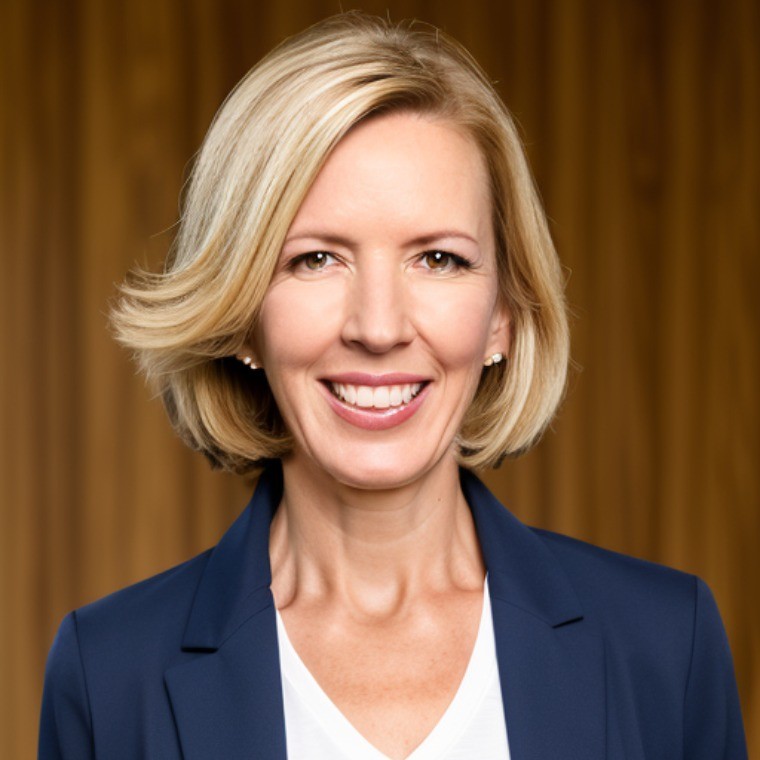
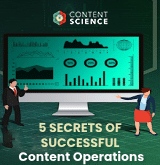
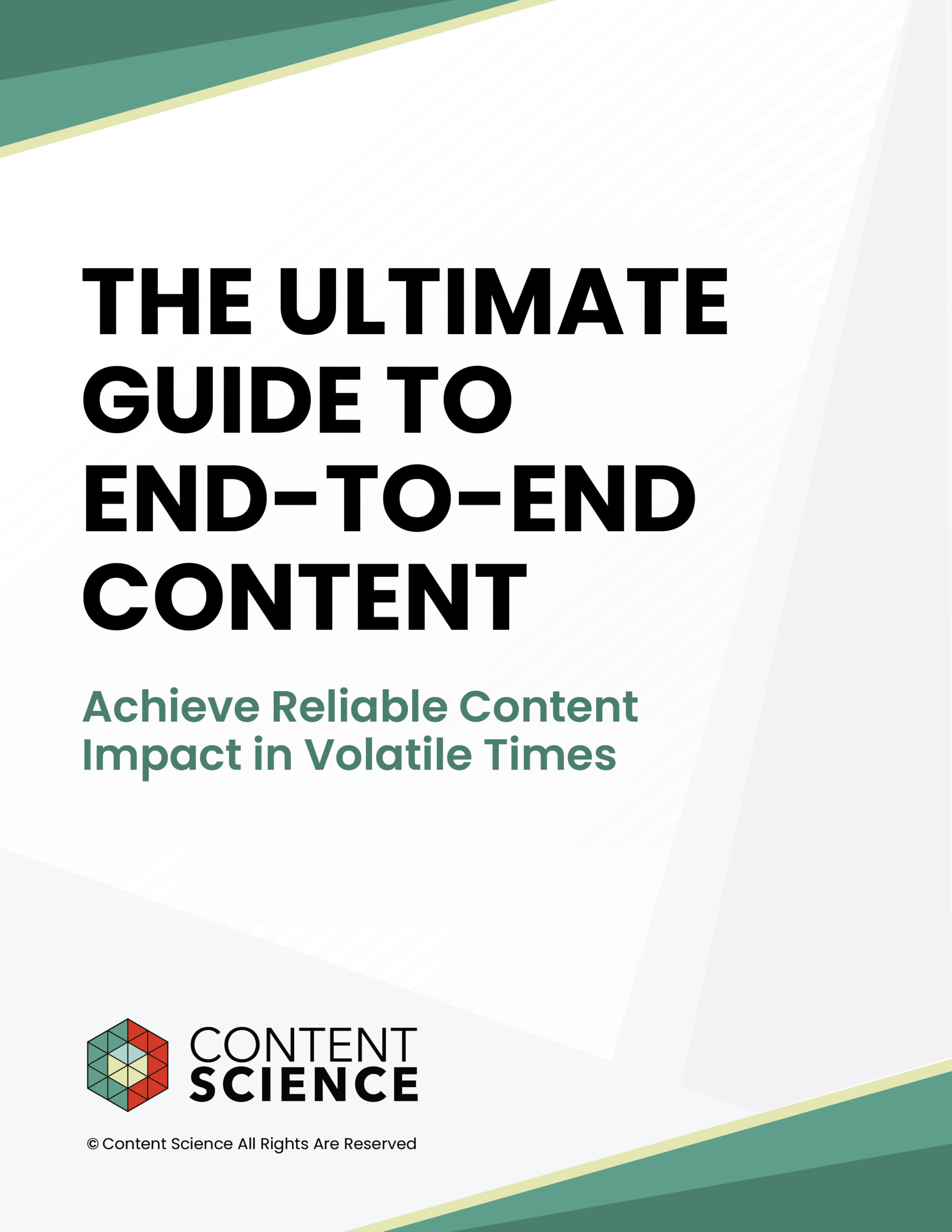
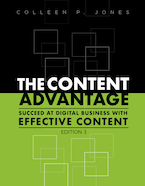
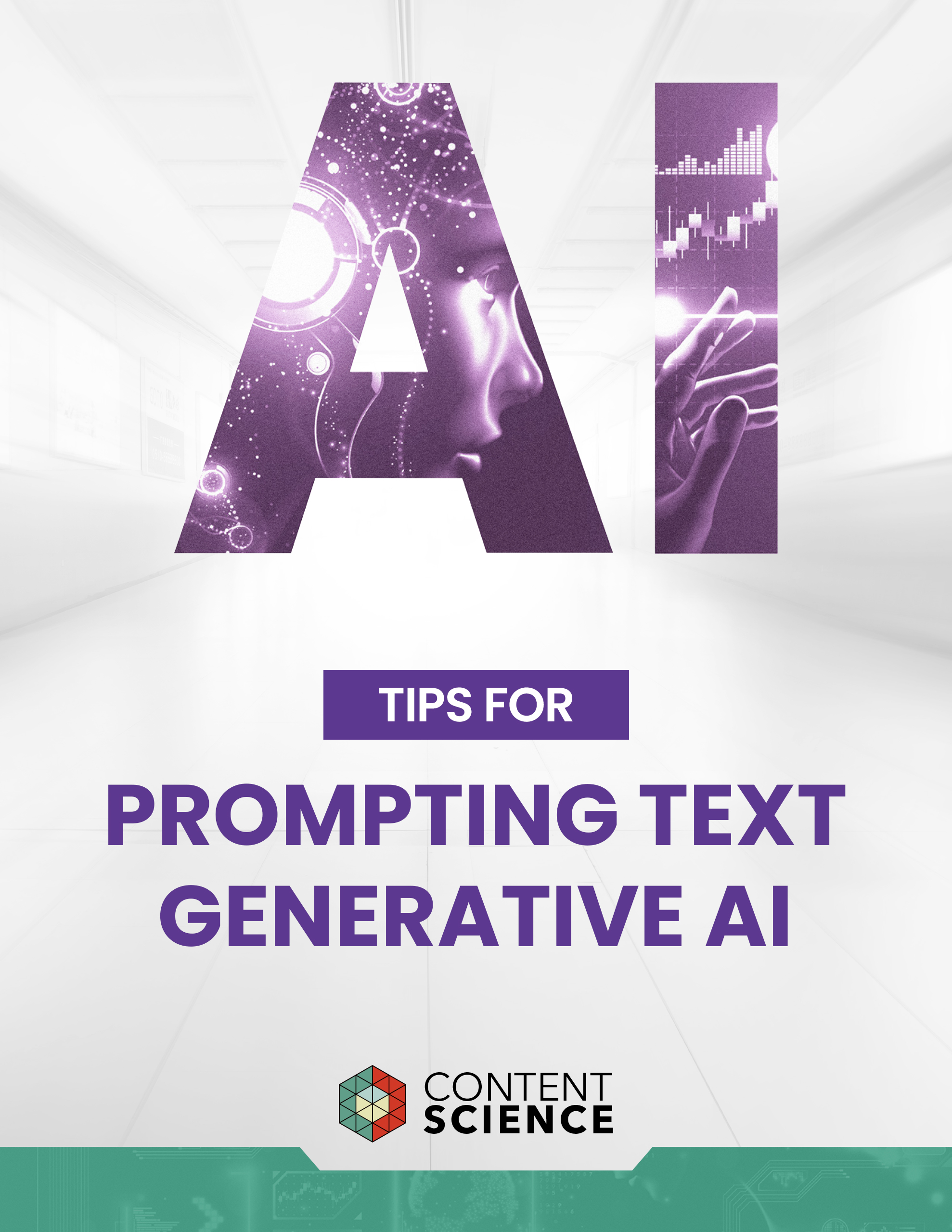
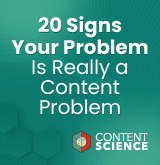
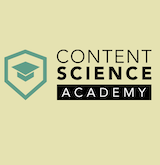
Comments
We invite you to share your perspective in a constructive way. To comment, please sign in or register. Our moderating team will review all comments and may edit them for clarity. Our team also may delete comments that are off-topic or disrespectful. All postings become the property of
Content Science Review.